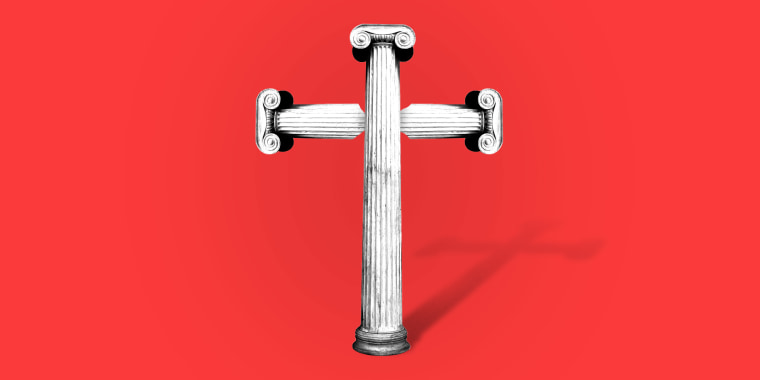Rep. Lauren Boebert, a Colorado Republican, told a church congregation in her state last month, “I’m tired of this separation of church and state junk. It was not in the Constitution, it was in a stinking letter and it means nothing like what they say it does.” According to Boebert, “the church is supposed to direct the government.”
A government church, the Church of England, is one of the reasons the colonies wanted to be free of England.
Founding father and third U.S. president Thomas Jefferson would like a word. Jefferson wrote that “stinking letter” that Boebert mentions to the Danbury Baptists in 1801, and it cited the establishment clause of the First Amendment to the Constitution. It’s that clause that Jefferson described as “a wall of separation between Church & State.” It clearly states, “Congress shall pass no law respecting an establishment of religion or prohibiting the free exercise thereof.”
A government church, the Church of England, is one of the reasons the colonies wanted to be free of England. Boebert often demonstrates her ignorance of both the Constitution and Christianity, but it’s distressing that her belief that the government should help further religion appears to be shared by the conservative wing of the Supreme Court.
Its rulings this term in Carson v. Malkin and Kennedy v. Bremerton School District suggest that the six conservatives who make up the court’s supermajority are more than happy to tear down that wall of which Jefferson spoke. These two rulings, one making private religious schools in Maine eligible for public tuition reimbursement funds and the other allowing a school official to publicly pray while at school, portend more trouble for public education in America and bring us closer to Christianity as our de facto state religion.
Some have said that the court is chiseling away at the establishment clause. I say it is using a hammer to rid itself of it.
This court is elevating the free exercise clause over the establishment clause and, thus, deciding that religious belief and practice should overrule the prohibition against the government favoring religion. But what does this mean in actuality?
Carson v. Malkin means religious schools in Maine can participate in that state’s school voucher programs, which Catholics and evangelicals have long wanted. Such school choice programs were designed to circumvent and eventually bankrupt the public school system. Betsy DeVos, the secretary of education during former President Donald Trump’s term, has been a leading voice in promoting school choice and voucher programs, and with last month’s Supreme Court ruling, there will be an escalating push for such programs. Republican lawmakers have introduced and promoted a federal school voucher program, which, if successful, will further erode public education by sending public dollars to private schools that are allowed to discriminate on the basis of sex, race or creed.
Since Engle v. Vitale, a 1962 ruling that found that prayer in school violates the establishment clause of the Constitution, Republicans and conservative church leaders have claimed that a lack of prayer in schools has caused the country to decline, and they have looked for ways to get prayer back in schools. Kennedy v. Bremerton means that free exercise of religion in public spaces, including schools, is permissible. Writing for the majority, Justice Neil Gorsuch described plaintiff Joseph Kennedy, a public high school football coach, as having been terminated for quietly praying, but Justice Sonia Sotomayor calls out Gorsuch in her dissent and points out that Kennedy consistently prayed in public, on the 50-yard line of the football field, and with the participation of students who gathered around him.
Both decisions allow Christianity to serve as a “state” religion, but what happens when Jews, Muslims, Hindus and others ask for the same consideration? How will the court prevent privileging Christianity?
These are all important questions that will likely be addressed in future litigation, but given that state and federal courts have been stacked by conservatives, we’re likely to see the U.S. moving ever closer to a state religion. As Justice Sotomayor wrote in her dissent in the school prayer case, “This decision does a disservice to schools and the young citizens they serve, as well as to our Nation’s longstanding commitment to the separation of church and state. I respectfully dissent.”
Stay tuned. There’s going to be a lot more praying at school athletic events, as well as more religiously affiliated schools funded with your taxpayer money through vouchers. Boebert will still be wrong about what the founders intended, but not so wrong about what today’s courts will allow.

